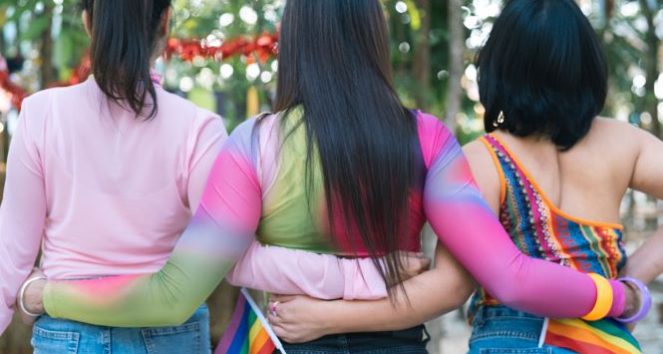LGBTQ+ Teens and Mental Health: What Can Help

May 30, 2023
Unfortunately, LGBTQ+ teens often deal with stressors like discrimination and bullying, which can negatively impact their mental health. This includes increased depression, anxiety and suicidal thoughts and behavior. As we close out Mental Health Awareness Month (May) and welcome Pride Month (June), it’s the perfect time to raise awareness about mental health struggles for LGBTQ+ teens. Increasing visibility to these issues is more important than ever due to things like the “Don’t Say Gay” law in Florida, which prevents teachers from even mentioning sexual orientation or gender identity in school.
Although many teens’ mental health is affected by anti-LGBTQ+ measures and prejudice, there are also sources of support. I talked with some teens about their experiences and what has helped them.
The Facts
Just because someone identifies as LGBTQ+ does not mean they will struggle with depression or anxiety. However, the lack of acceptance they often face makes them more likely to. For instance, 73% of LGBTQ+ youth reported experiencing symptoms of anxiety and 58% reported experiencing symptoms of depression, according to The Trevor Project’s 2022 National Survey on LGBTQ Youth Mental Health, which collected data from LGBTQ+ young people in the U.S. aged 13 to 24.
Inclusivity and Acceptance
Self-acceptance can be difficult for LGBTQ+ teens. “I didn’t accept myself for the longest time,” shares Lily, 17, of Orlando, FL, who uses she/her pronouns. “I still felt societal pressure to be straight and I loathed that part of who I am.” As she worked to increase her self-worth, she found having peers that validated and accepted her to be helpful.
For some young people, their parents/caregivers, friends and peers show acceptance and respect. For others, like my friend Ella (not her real name), 16, of Colmar, PA, that’s not always the case. Ella, who uses she/her pronouns, says she knew her parents did not support people who are LGBTQ+. It was difficult for her to find the courage to come out to them as a lesbian. Unfortunately, when she did, she was told something was wrong with her. Reminder: there is nothing wrong with you if you identify as LGBTQ+. Over time, she developed symptoms of depression and anxiety.
Luckily, Ella felt inclusivity from her friends. With help from them and the school guidance counselor, she learned to accept herself.
I should add that not everyone feels comfortable coming out to family members. If there is any concern that family will not be supportive and there is a risk of abuse or neglect, it may be better to not reveal this part of yourself to them at this time and seek acceptance and support elsewhere.
What Can Help
As mentioned, having a solid group of friends or peers to talk with can be beneficial. “In times of difficulty, my friends were usually where I went,” says Lila, 16, of Marlton, NJ, who identifies as genderqueer and uses he/him pronouns. “Whenever I was scared or anxious…they were able to help and provide some comfort.”
Having a safe space allows for a sense of belonging. This can be different for different people. For some, it can be friends or family. For others, it can be a safe online space like Q Chat Space or TrevorSpace. Involvement in a sport or other extracurricular activity or hobby can bring a sense of community. So can being part of a GSA (which can stand for Gay–Straight Alliance, Gender-Sexuality Alliance, or something else) at school. Additionally, LGBTQ+ youth who found their school to be LGBTQ+ affirming reported lower rates of attempting suicide, according to The Trevor Project survey mentioned above.
Everyone is different, and it may feel difficult to find what works. Please know that there are resources to help LGBTQ+ young people when they are struggling.
If you are experiencing any distress and would like to talk to someone, check out these resources:
The Trevor Project
The Jed Foundation

